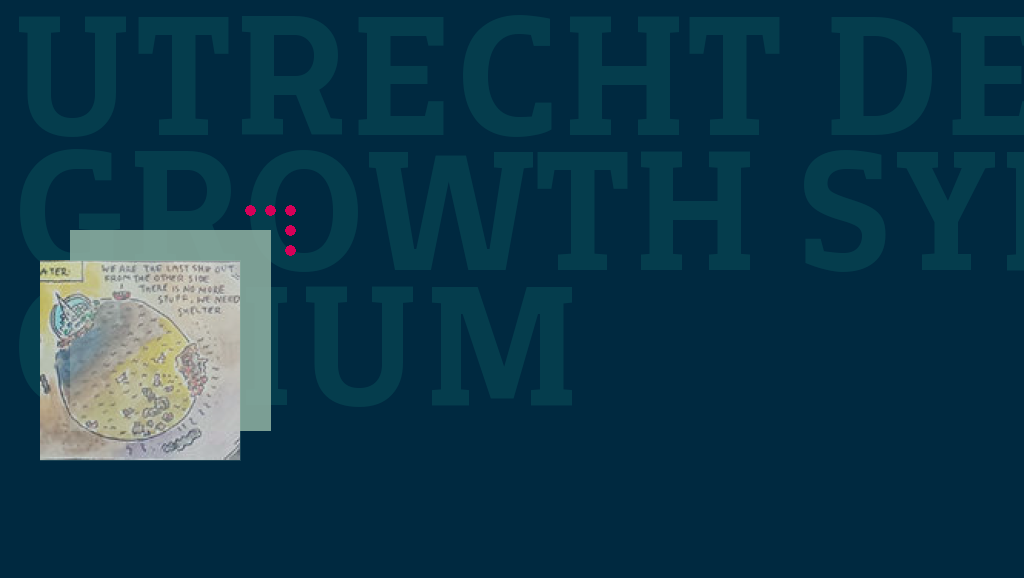The first Utrecht Degrowth Symposium was held at Utrecht University on Friday 28 June, aiming to consolidate the emerging degrowth platform in the Netherlands with international experts from various disciplines. As Foreign Correspondent I attended on behalf of the Bassetti Foundation. What follows is a short report with an overview of the topic from my own personal perspective.
For readers who may not be familiar with the terminology, degrowth is a social movement and academic field that aims to envision pathways to a sustainable future. These pathways include but are certainly not limited to the democratic and redistributive downscaling of the material size of the global economy, with the goal of allowing societies to live within the reproductive limits of ecosystems.
Since its origins in the early 2000s, degrowth has garnered a certain traction, and is now discussed, researched and practiced (predominantly on small scale) across Europe. However, as the symposium website explains, the idea is not universally accepted with some experts arguing that sustainability can be achieved through innovations that contribute to economic growth.
From a Responsibility perspective both of these forms find support in different camps. Some argue that an innovation can be classified as responsible because it may work towards addressing one of the grand challenges (several authors use arguments that sustainability forms an integral part of any responsible process and therefore that an innovation that leads to more sustainable practices can be called responsible) while others see human responsibility to consume less as the only viable approach towards a sustainable future.
Degrowth seems to lie in the second camp if we take the name on face value, but scholars argue that a shrinking of the economy is not strictly speaking the objective, but that taking growth as a goal in itself out of the system is the aim.
The following questions were posed at the symposium:
– What is degrowth?
– What does degrowth mean in practice?
– What is the academic and societal debate on degrowth about?
– Is degrowth a sustainable alternative to a society dependent on economic growth?
– Is this solely a discussion for the Global North, or also for the Global South?
After a musical greeting followed by a short introduction the floor was given to Dr Barbara Muraca of the University of Oregon who delivered a lecture entitled Degrowth as a project for societal transformation: its science and its relevance.
Muraca described how the global economy is tied to growth as it is a requirement for the current capitalist system. She painted a grim picture of political developments fueled by the lack of growth that leads to the economy being unable to provide what is necessary for the population. Many of the problems and developments that she described are visible today in countries facing long term economic problems. The answer she argues is not however to work towards more growth, but to reconfigure society so that it is no longer needed.
The second speaker was Dr Julien-François Gerber from the International Institute of Social Studies. In Degrowth in the Global South: scientific and policy perspectives, Gerber raised the issue of degrowth policy in developing countries. He argued that degrowth is not a form of punishment, it is a positive strategy that can be adopted across the board, even though highly developed economic systems seem to put more strain on the ecosystem than those less developed. Gerber offered several examples of alternative ways of measuring economic success (not using GDP) demonstrating that higher forms of economic development as measured in conventional terms do not necessarily lead to happier populations.
This is not an easy argument to address, as we might imagine. Suggesting that policies should not be directed at growth while services are needed for the general population could be met with resistance and seen as unfair. Many of the environmental issues under discussion can be seen more as the product of highly industrialized systems than their less developed counterparts. Gerber argued however that under current conditions the growth based economic model does not realistically offer a leveling of the playing field in the near future, as the time scale necessary is much too long.
After a short interactive break that included an exhibition of degrowth inspired art (see photos), Nina Treu of Konzeptwerk Neue Ökonomie delivered Degrowth in Practice: Examples from Germany in which she described recent developments within the German degrowth movement, leading on to a round table discussion shared with Ties Temmink of Extinction Rebellion and Kris de Decker of Lowtech Magazine.
The panel and audience raised several interesting issues related to the practicalities of such a change of economic tack. Issues such as how to plan for pensions to accrue, the governance of sustainability transitions, how to implement lifestyle changes on a large scale (examples of current pathways tended to be small scale home production and consumer choices) and the issue of the urgency to do so.
As we might imagine, many of these issues proved difficult to practically address in terms of concrete action plans, with many of those present urging further conversation, research and practice.
Here some photos of the event:
—————–
















